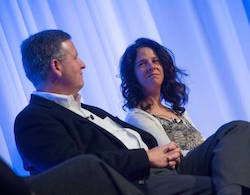 Terms like local, organic, natural and sustainable dominate the marketplace, but what does it all mean? One of the most tangible examples of sustainability is the use of drastically fewer resources over time, something many areas of agriculture, especially the dairy industry, can say is true of their production methods. Regardless of this fact, many large-scale production operations face a majority of the criticism from the sustainability movement.
Terms like local, organic, natural and sustainable dominate the marketplace, but what does it all mean? One of the most tangible examples of sustainability is the use of drastically fewer resources over time, something many areas of agriculture, especially the dairy industry, can say is true of their production methods. Regardless of this fact, many large-scale production operations face a majority of the criticism from the sustainability movement.
The concept of sustainability was central to the latest installment of Food Dialogues held recently at the Dairy Strong conference in Madison, Wis., co-sponsored by U.S. Farmers and Ranchers Alliance (USFRA) and Dairy Strong. Hundreds of attendees gathered as Michael Specter, a food and science staff writer with The New Yorker, moderated a diverse panel that included a registered dietitian, a conservationist, and a fifth-generation dairy farmer, to discuss how consumers and farmers define sustainability and the various methods and technologies used on farms, small and large, to protect the environment.
Sustainability is a topic that one panelist, Steve Peterson, centered his entire career around. Peterson is the former Director of Sourcing Sustainability at General Mills, with 28 years of experience in the company, and a lifelong farmer. He operates a crop and beef farm in central Minnesota, and his work on sustainability with General Mills extended not only throughout the US supply chain, but allowed him to influence producers overseas, in Africa and Asia. He is very respected throughout the food industry, and is considered an expert on sustainability.
Peterson sat down for an interview after the discussion, where he elaborated on several topics the panelists brought up, focusing on the skewed public perception of the important role business plays in sustainability.
“There’s a common assumption that ‘local’ and ‘small’ and ‘organic’ are all so good and that anything ‘big’ is bad when it comes to businesses, and that’s just not the case,” Peterson said. “Big is not bad, and in fact, big is really good. It brings affordability, and it brings safety. The cost of food in the US is less than 10 percent of our disposable income, I think it’s around 7 or 8 percent, which is the lowest of anywhere in the world, and we take that for granted. My father always said that we need a good food shortage in the United States, and then people will appreciate what they have.”
Peterson also highlighted a few of the valuable roles that large businesses play surrounding the concept of sustainable food production.
“A man named Jason Clay, one of the directors of World Wildlife Fund (WWF), was one of the first to say that we realistically just can’t go to millions of farmers around the world, but we can go to a handful of companies, and influence them to take their own influence to help move the dial on sustainability,” he said. “What’s really been exciting for companies like General Mills is that this push towards sustainability has brought us closer to producers.”
Listen to my full interview with Steve here:
Interview with Steve Peterson, Sustainability Expert
